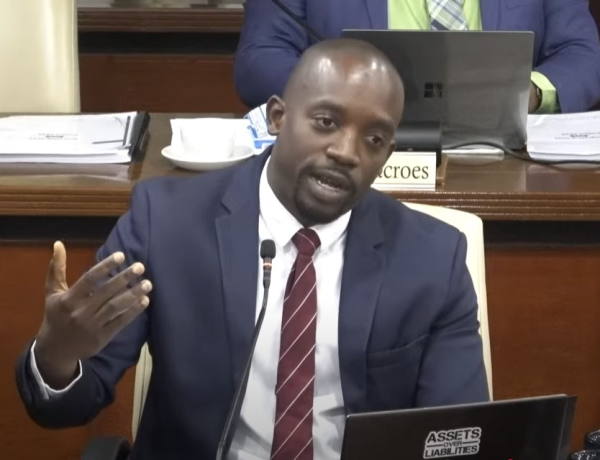 PHILIPSBURG:--- MP Ardwell Irion has raised several pressing concerns regarding public governance, financial accountability, and the state of key institutions in St Maarten. His questions addressed challenges such as corrections management, operational oversight, and the protection of human rights. The government, in turn, provided responses that sought to clarify ongoing efforts, acknowledge challenges, and outline steps being taken to address these issues.
PHILIPSBURG:--- MP Ardwell Irion has raised several pressing concerns regarding public governance, financial accountability, and the state of key institutions in St Maarten. His questions addressed challenges such as corrections management, operational oversight, and the protection of human rights. The government, in turn, provided responses that sought to clarify ongoing efforts, acknowledge challenges, and outline steps being taken to address these issues.
Prison Conditions and Human Rights Concerns
MP Irion highlighted troubling conditions within St Maarten's prison system, citing inadequate access to sunlight, prisoners sleeping on the ground due to extreme heat, and the suspension of phone calls and visits. He questioned the impact of such conditions on inmates’ rights and the country’s legal exposure, especially in light of recent European Court of Human Rights rulings that resulted in compensation payments.
The government's response acknowledged the difficult circumstances, explaining that prisoner visits have been suspended primarily for operational reasons (including the repurposing of visiting rooms), not solely safety concerns. Regarding prisoners’ well-being, the government noted that access to sunlight is provided as much as possible within logistical and security constraints. However, recent court findings indicate there is room for improvement. Regarding compensation for human rights violations, the government clarified that, according to the Charter for the Kingdom of the Netherlands, the Kingdom bears ultimate responsibility for such liabilities, although St Maarten is committed to future compliance.
Regarding early release and rehabilitation, the government indicated that the Justice and Immigration Services (J&IS) are actively involved in reviewing inmate cases for possible release and commensurate monitoring. However, they emphasized the need to coordinate with all legally affiliated stakeholders to ensure due process and public safety.
Personnel Shortages and Financial Implications
Personnel challenges and the reliance on outside support were central to MP Irion's inquiries. He pointed out that foreign guards from Aruba and Curaçao were brought in to staff the prison, and questioned the cost and sustainability of such arrangements. He further asked whether local staff shortages had been adequately addressed.
The government responded by stating that the deployment of correctional officers from Curaçao and Aruba was necessary due to current capacity constraints. While Aruba was assisted by partially covering deployment costs as an act of Kingdom solidarity, St. Maarten has assumed the expenses for housing, transportation, and daily allowances of these officers. Efforts are ongoing to mobilize all available local personnel, with help from entities such as the Immigration and Border Protection Services (IBPS), Police Force of St Maarten (KPSM), and the Voluntary Corps of St Maarten (VKS). Despite these efforts, absenteeism remains a persistent challenge, hindering operational continuity. To address this, the government is reviewing recruitment and staff engagement strategies and remains committed to strengthening the local workforce for long-term resilience.
Infrastructure Issues and Accountability in Public Spending
MP Irion questioned the effectiveness of spending on prison and police station infrastructure, highlighting instances where funding allocated for vital repairs—such as toilets and mattresses—was not utilized on time, resulting in substandard conditions until prompted by judicial visits.
In response, the government admitted that, in practice, repairs and renovations have been subject to delays, often due to funding bottlenecks or logistical disruptions. For example, the recent repairs at the police station were indeed expedited only after a judicial inspection. The government emphasized that a greater focus is being placed on preventive maintenance and the transparent tracking of project progress, with new accountability mechanisms being implemented to ensure that public funds are used efficiently and that essential improvements are prioritized.
Broader Context and the Path Forward
Both the queries of MP Irion and the responses from government authorities illuminate intertwined challenges in Sint Maarten's governance and institutional management:
- Human Rights and Legal Compliance: The government recognizes the need for humane prison conditions and is working toward enhanced compliance, coordinating with the relevant authorities in the Kingdom where legal responsibility applies.
- Workforce Sustainability: Authorities are addressing local staff shortages by fostering recruitment, partnerships, and reviewing absenteeism patterns, while acknowledging that short-term reliance on Kingdom partners remains necessary.
- Accountability and Infrastructure: Delays and shortfalls in infrastructure upgrades are acknowledged, with renewed attention to accountability and budget transparency.
- Rehabilitation and Policy Coordination: Early release policies and rehabilitation efforts are being considered in consultation with all legal and public safety stakeholders to ensure a balanced and practical approach.
- Conclusion: Collaborative Reform and Renewed Accountability
- Through these questions and government responses, it is clear that Sint Maarten faces significant but surmountable challenges in human rights, governance, and operational management. The government’s acknowledgment of these issues, paired with its stated commitment to reform, points toward a collaborative path forward. Continued transparency, improved staff management, and a stronger focus on timely, humane solutions are essential steps in rebuilding public trust and advancing Sint Maarten’s justice and public service institutions.